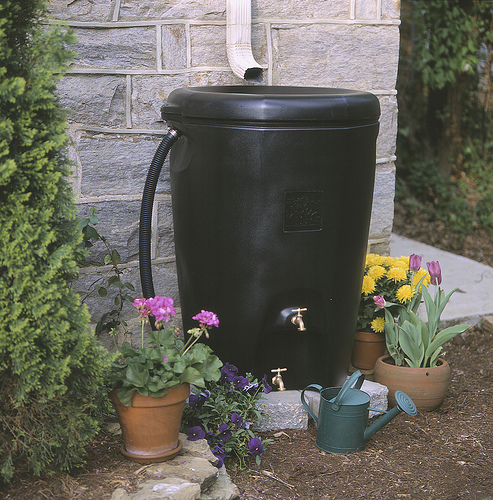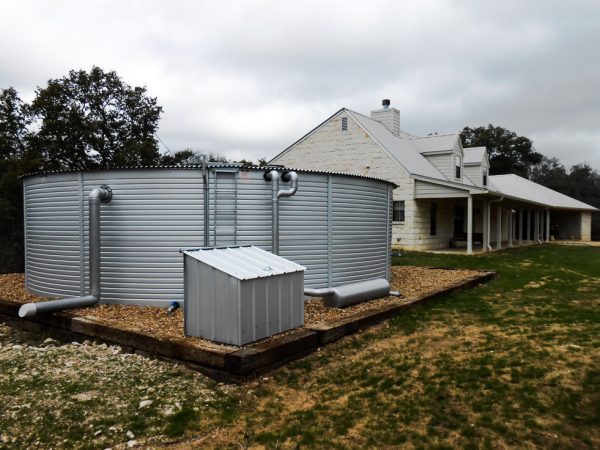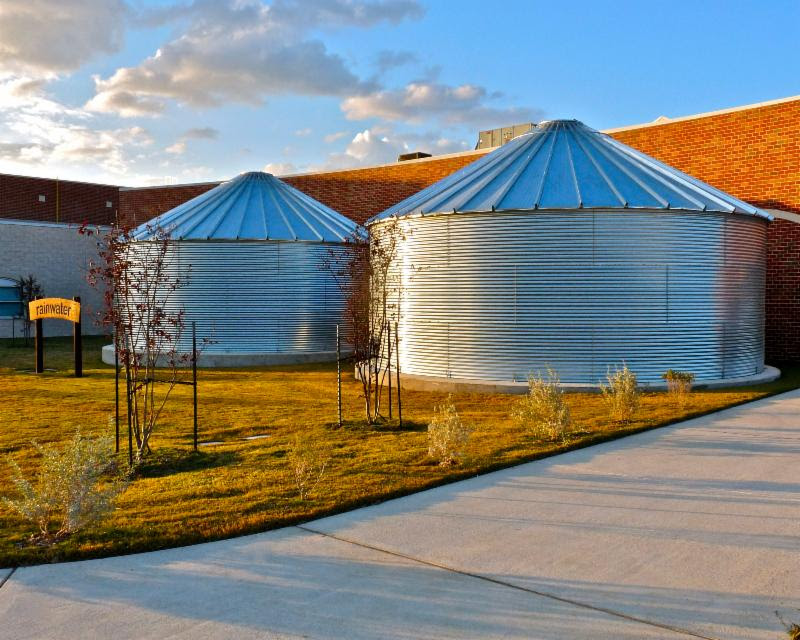 Rainwater harvesting is an essential strategy that will enable the State to meet our future water demands. It provides an immediately available alternative water source at no additional cost to the State. It also raises public awareness of the need for water conservation and promotes active participation by our citizens. Rainwater harvesting systems are very effective stormwater management tools as well that provide flood control and stormwater pollution abatement opportunities.
Rainwater harvesting is an essential strategy that will enable the State to meet our future water demands. It provides an immediately available alternative water source at no additional cost to the State. It also raises public awareness of the need for water conservation and promotes active participation by our citizens. Rainwater harvesting systems are very effective stormwater management tools as well that provide flood control and stormwater pollution abatement opportunities.
While the benefits of rainwater harvesting are undeniable, they can only be realized through rainwater harvesting systems that have been constructed by installers that understand the intricacies of rainwater harvesting systems. The main issue then becomes how these systems are implemented in our built environment.
This is the intention of HB 173 which would establish a licensing program for any person or company who receives compensation to install rainwater harvesting systems. This license would promote the professionalism of Rainwater Harvesting System Installers and ensure the safety of the public. The bill is sponsored by Rep. Eddie Lucio III.
What’s at Issue Here?
The issue is that the practice of rainwater harvesting has a perception problem.
What do you think about when you hear “rainwater harvesting”?
You think about this…
While rain barrels do harvest rain and allow anyone to start harvesting rainwater very simply, in reality, rainwater harvesting is so much more.
This is rainwater harvesting…
Rainwater harvesting systems are being relied on to supply drinking water for entire households.
Rainwater harvesting is also this…
These systems are also being relied on to supply the irrigation demand for commercial properties such as schools, municipal buildings, businesses, and office buildings. These systems are very complex and intersect many different segments of the traditional building trades.
Therefore, the need to ensure the public safety with these systems is vital.
While you can see the nice, large cisterns in the pictures above, what you don’t see is the various components that make up the rainwater harvesting system. These components range from gutter systems, downspout piping, collection piping, inlet filtration systems, first-flush diversion systems, water level indication systems, pump systems, internal cistern controls that automate these systems, post-filtration and disinfection systems, and other ancillary components that complete these systems.
HB 173 would ensure that licensed rainwater harvesting system installers would have the required specialized training and experience for the installation of the entire rainwater harvesting system as well as ensure that these professionals continue to learn through required CEUs.
Let’s Clear Up a Few Points Before We Go Further
This bill:
- Does NOT prohibit a homeowner from installing his/her own system. I repeat… it does NOT require a homeowner to obtain a license to install a rainwater harvesting system on their own house;
- Does not prohibit individuals or companies installing systems under 500 gallons in capacity from charging for their services. Systems of this size or smaller are not practical to be used as a potable water source and are not deemed to be a threat to public health;
- Will ensure the safety of the public since rainwater harvesting systems will continue to provide future water supplies for the State of Texas;
- Will validate the profession, promote water conservation, and create economic growth in the State of Texas;
- Will firmly establish the State of Texas as the leader in promoting rainwater harvesting and water conservation, and;
- Will seamlessly transition to professional programs that are already in place.
The Only Water Professional That Doesn’t Require a License?
Rainwater harvesting system installation for compensation is the only water supply trade that does not require a license in the State of Texas. Nearly every other professional that interacts with water in Texas that could come in contact with the public already has a license requirement. Currently, the following water professions in the State of Texas require licenses to render their services for compensation:
- Water-well drillers and pump installers
- Plumbers
- Landscape irrigators
- Water system operators
- Wastewater treatment plant and collection system operators
- On-Site Sewage Facility (septic system) installers
- Water treatment specialists
- Customer service inspector (inspects for cross connections in water systems)
- Backflow prevention assembly testers
- Water haulers
Why is a License Necessary?
- In order for the public to be able to rely upon a group of competent practicing professionals, we must have a program that assures appropriate education, testing and evaluation of the licensees. It is critical that our designs are based on sound hydraulic calculations in order for the conveyance and storage systems to properly perform during storm events. It is even more important that proper steps are taken during the filtering and disinfection process to assure the public that a reliable quality of water is produced, suited to their intended use. This end use could be for no more than landscape irrigation or it may be to provide a family with their sole source of water for all purposes, including drinking water. At this point, it’s a matter of public health and safety.
- Licensing will assure that installers have appropriate education, training, and expertise to protect public health.
- Licensing will also assure dependable systems functioning through the implementation of proper design, installation and maintenance practices.
- A rainwater harvesting system installer is responsible for bringing new water sources online each time they place a rainwater harvesting system into service. Individually, these systems are responsible for thousands of gallons being captured, treated and utilized for beneficial uses. Collectively, they are responsible for generating millions of gallons of water each year. The potential for many millions more to be harvested will more readily be realized once the design and installation process is licensed.
- Certification of properly designed and installed systems will enable homes to be conventionally financed as financial institutions gain confidence it the reliability and safety of these water supply systems.
- The Licensing Program will promote public confidence in the practical application of Rainwater Harvesting and predictably expand the utilization of Rainwater Harvesting across both residential and commercial market sectors.
- General acceptance of the rainwater harvesting business would mean jobs for designers, installation crews, engineers, irrigators, and manufacturers of system components, (Fittings, gutters, tanks, valves, pumps, and treatment products)
- The Licensing Program will be able to draw upon the existing collective expertise of industry leaders to provide the educational materials and qualified training programs for appropriate direction while establishing the Licensing Program.
- The State of Texas will have an opportunity to continue its leadership role in water resource management by establishing this Licensing Program.
- Licensees would receive appropriate instruction to qualify them, by education standards, to design and install rainwater harvesting systems that are appropriate to the circumstances of the situation.
- Practicing professionals could compete fairly with each other while protecting the general public’s health and safety, especially in systems tasked to produce a potable water supply.
- Right now, anyone can represent him or herself as an “expert” designer, inspector or repairer of a rainwater harvesting system and promote their ability to design or work on a rainwater harvesting system. Although the American Rainwater Catchment Systems Association (ARCSA), a private, not-for-profit organization was started in Texas over 20 years ago to provide a national centralized information resource to promote the sound development of the rainwater harvesting businesses in the US, has an extensive training program whereby individuals can become trained and submit evidence of relevant experience to be designated as Accredited Professionals, Accredited Inspectors or Master Rain Harvesters and must thereafter submit proof of continuing education, there is no requirement by the State for persons holding themselves out as experts to have achieved any accreditation from ARCSA or a license from the State.
Why is Rainwater Harvesting important to Texas?
- Rainwater harvesting is an essential strategy that will enable the State to meet our future water demands.
- Every inch of rain produces approximately 600 gallons of water for every 1000 square feet of roof area. A 2,000 SF roof will produce approximately 1,200 gallons of water for each inch of rain. In Central Texas, we get an average of 30” of rain per year. This 2,000 SF roof is capable of generating 36,000 gallons of water per year. By contrast, a moderately-sized commercial building of 20,000 SF is capable of producing 360,000 gallons of water per year.
- Rainwater harvesting raises public awareness of the need for water conservation and promotes active participation by our citizens.
- Rainwater harvesting provides an immediately available alternative water source at no additional cost to the State.
- Rainwater is currently used as a primary source of water in many locations around the world and the potential for the future growth of this supply is very significant.
- Not only does the use of rainwater save municipal water supplies, it also saves the associated energy required to pump municipal water from its source, run the water through the treatment facility and move the water from the treatment facility to the end user.
- Properly designed and installed, rainwater harvesting systems work well in all parts of the State, even during drought years.
- Rainwater harvesting systems are very effective stormwater management tools that provide flood control and stormwater pollution abatement opportunities.
- Rainwater collection is a decentralized system which makes for a more resilient water supply system, buffering water supply from potential interruptions.
- Most new water sources require years of planning, design, permitting, financing and construction before they can provide useful results to address today’s challenges. This is not the case with rainwater harvesting systems. For most residential systems, it only takes a few weeks to complete a rainwater system from design through construction. In most commercial retrofit settings, it may be a matter of months.
- In addition to all of the positive impacts of providing water where it is needed, rainwater harvesting will provide jobs for designers, installing contractors and their crews, jobs for manufacturers of gutters, PVC piping and fittings, pumps, controllers, filter and disinfection equipment and supplies and irrigators.
What you can do to support this bill
I hope that you see that this bill is very important in creating more opportunities in the uncertain water future of Texas. Rainwater harvesting is a reliable source of water but these systems need to be implemented corrected to ensure not only public safety but also their continued operation.
Please call your representative and senator to voice your support for this bill.
In case you don’t know who represents you in the Texas Legislature, you can find your legislators here.






